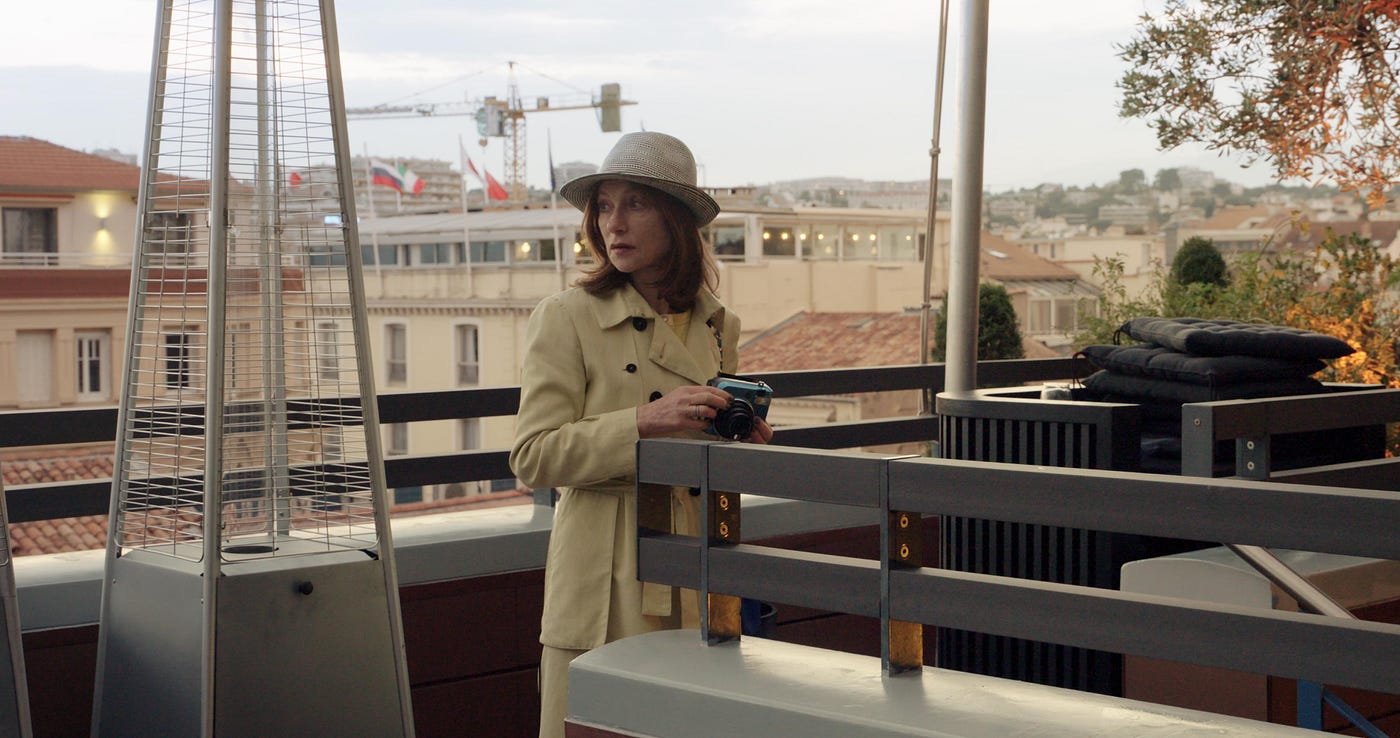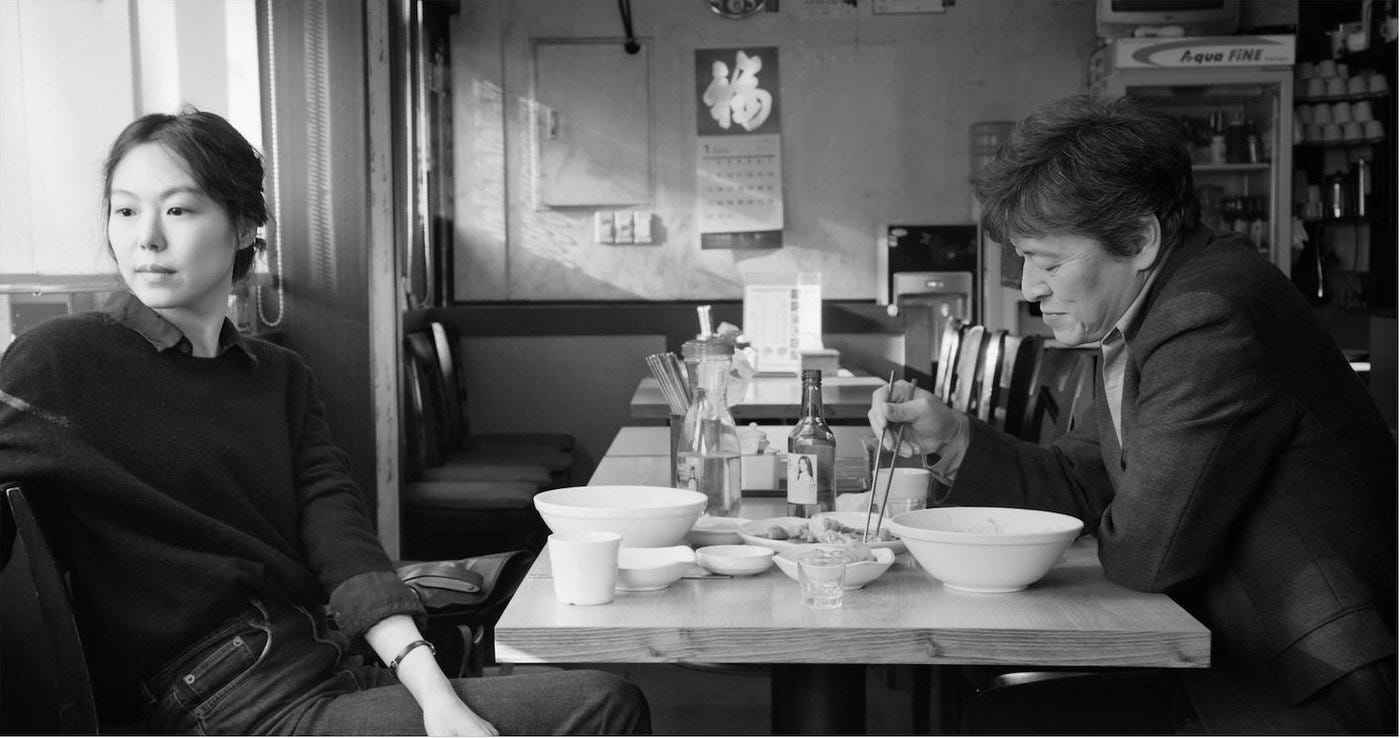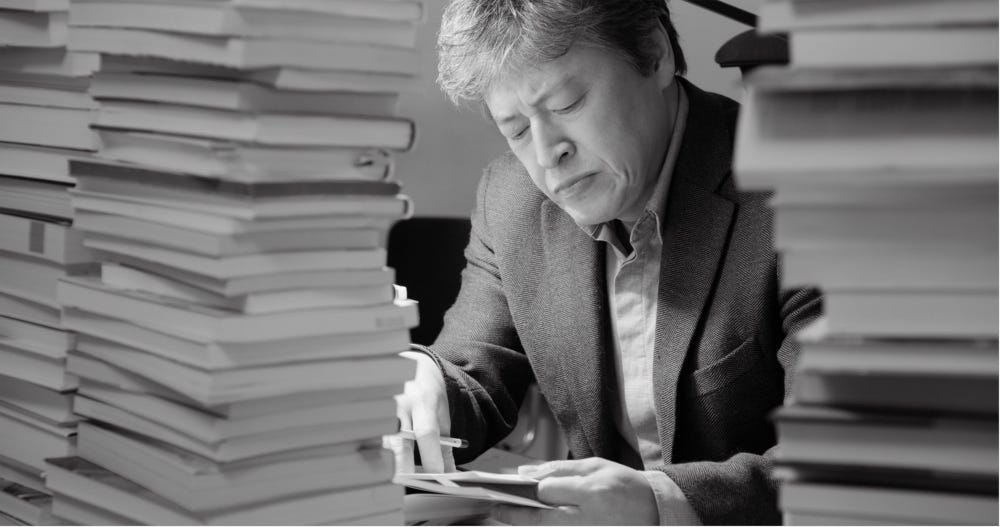Between Work: A Conversation on Claire’s Camera and The Day After

Evan Morgan: The sun’s out, palm trees are in sight, and we’ve temporarily traded in soju for sancerre. Hong Sang-soo is en vacance again. I don’t know about you Sean, but I’m always happy to see Hong in the literally and figuratively breezy mode that he takes up in Claire’s Camera. The seasons have long played a central role in the Hong project, though it seems that the tonal vacillation between his summer and winter films grows with each passing year. Hong’s sense of humor lilts along during the warmer months, and though it never goes entirely dormant in wintertime, it cools and takes on a serrated edge, like cracked ice. Claire’s Camera, in keeping with this seasonal dichotomy, might be his most amiable movie yet, defined as it is by Isabelle Huppert’s warm naiveté and the dabs of sunflower yellow provided her summer frock. Huppert’s flightiness bleeds into the plotting too, which moves with a nonchalance that borders on amateurishness. I mean that as a compliment. It strikes me that Hong’s acceptance into the upper echelon of the art cinema world (the film unfolds during Cannes, after all) occurred simultaneously with his loosened production methods, and though the competition gatekeepers prefer the more somber Seoul films, the animating spirit of later Hong owes much to the laidback atmosphere of friends who vacation together and decide, ‘what the hell let’s make a movie.’ It’s not for nothing that this most amateur of Hong films is set against the backdrop of the world’s premier film festival.
Sean Gilman: Agreed that Claire’s Camera is for sure a sunny film, and the scenes with Huppert and Kim Minhee’s budding friendship are among his most charming, but there’s as well an uneasiness to it, a bleakness that’s missing from films like In Another Country and Hill of Freedom. It’s kind of an inverse of his other Cannes film, The Day After, which is for the most part a stark and serious exploration of infidelity and one man’s pathological attempts to justify his own terrible behavior, which is nonetheless leavened by moments of genuine humor and hopefulness. Where Huppert is the destabilizing influence in Claire’s Camera, witnessing three sides of a love triangle, intrusive but without judgement, Kim is the unpredictable force in The Day After, mistaken for the illicit lover while potentially being groomed to take over that lover’s role. In both films the fourth person throws into relief the hypocrisies and venalities of the triangle members, but in The Day After, Kim ends up happy and free, while in Claire’s Camera, in what seems to me to be the final scene in the film’s chronology, though we see it a few scenes before the movie actually ends thanks to a trademark Hongian temporal jumble, Huppert’s intrusiveness goes too far and she’s shouted away by a distraught and devastated Kim. The two films compliment each other like this, and also form a kind of trilogy with On the Beach at Night Alone, all films in which Kim Minhee deals with the fallout from a pompous man cheating on his significant other. (On the Beach… is also a Hong vacation film that takes place in wintertime, something he hasn’t done since. . . The Day He Arrives?)
But I agree that Claire’s Camera has that loose vibe that has characterized Hong’s best work this decade. In contrast, The Day After seems in many ways like Hong trying to fit into the established art cinema world. It felt to me like Hong trying to remake My Night at Maud’s or In the Shadow of Women or something. I liked it, but like Right Now, Wrong Then, it’s Hong watered-down, Hong being conventional for the masses.

Evan Morgan: It hadn’t occurred to me that the scene between Kim and Huppert might come last, chronologically speaking, but it makes some sense. Though that detail went right past me, I was pleasantly baffled by the first photo we see of Kim taken by Huppert. It frames her against a stucco white wall, looking into the lens. No such moment seems to exist within the text of the film, and when we do see Kim and Huppert meet for the first time, the beachside setting is entirely different from what appears in the photograph. Have they met before, offscreen? Claire’s Camera is a slipperier film than it might seem, which, as always, makes me eager to revisit it and languor in its small mysteries again.
I like that you linked Claire’s Camera, The Day After, and On the Beach at Night Alone via Kim’s point in each love triangle. I’d also propose another connection, inextricable from the infidelity that runs throughout Hong, but highlighted more frequently since Kim took center stage: work. Perhaps I overstated the case for Claire’s Camera as a vacation film because it does hinge on the summary dismissal of Kim from her job. Kim’s boss cans her after a delivering a lecture on the need to live honestly, which we come to understand is a consequence of her dalliance with the boss’s boyfriend. Pleasure constantly disrupts business in these recent films, Kim’s career thwarted each time by her relationship with a man a few rungs up the ladder. If, as you suggest, The Day After ultimately sets Kim free from the patriarchal humiliations of the workplace, it makes for a rather fitting conclusion to this makeshift trilogy.
And yet, I didn’t feel borne back to The Day After in the same way that I did with Claire’s Camera, and I spent much of my day after wondering why it felt remote. Certainly it’s a starker film, as you say. Some of that starkness emerges from the monochrome (it’s worth mentioning that Hong continues to outclass everyone of his peers when to comes to black and white, save for the aforementioned Garrel) though the utter boorishness of the main character counts for a lot. Kwon Haehyo’s book publisher behaves more repugnantly than any Hong leading man-child in, I don’t know, a decade? Given the stacked bench, that’s saying something. Kwon imbues him with genuine anguish, especially in that moment early on when he breaks down alone in an outdoor gym. Still, watching him treat women like unsolicited manuscripts for the first half of the film kept me at bay, at least until the focus shifted to Kim. I think my affection for his recent comedies lulled me a bit. The Day After forced me to reorient myself to Hong’s more unpleasant, though not unfamiliar, male world.

Sean Gilman: I could be wrong about where the Kim/Huppert scene actually takes place, it may be before they actually met, but still a few days after Kim was fired. Huppert does say she’d seen her around a few times before formally introducing herself (that photo you reference I think comes from that time). It might in fact have been the night before Huppert and the director met (didn’t he say he’d been drinking too much the previous evening?) As with a lot of Hong films, the chronology is ultimately speculative, but it makes sense to me that Kim finally cannot handle the public nature of her breakdown, the fact that someone witnesses her loss of composure. But if Kim ultimately gets rehired, then my reading is probably wrong (because she’d have been rehired after meeting Huppert, but in the breakdown scene she’s still fired), that in fact Kim and Huppert’s friendship blossoms after this initial emotional eruption, and that Kim simply didn’t recognize Huppert as the woman her took her photo some days earlier.
This changes as well how one sees the final scene, which is of Kim packing up promotional materials at work. Is this the chronological end of the film? or, as indicated by her outfit, is this the action that immediately precedes her firing at the beginning of the film? Hong’s ability to take such a simple story (a love triangle plays out at Cannes while a slightly nutty French lady takes pictures) and mystify it to the point that we have no way of really being certain when it begins and when it ends is one of my favorite things about him as a filmmaker.
We don’t generally think of Hong as a man who makes films about work, rather they tend to take place in the spaces between work: vacations, bouts of writer’s block, the kinds of festival promotional lectures filmmakers give between the actual making of films, etc. In the first half of his career, and occasionally in the latter half, the primary character has been a man in charge, the one doing (or not doing) work. But his films with Jung Yumi (Oki’s Movie and Our Sunhi) and in these three Kim Minhee films, the focus is more on the woman negotiating the demands of a male authority figure (who is also generally a (failed) love interest). Sunhi and Oki, like Lee Youyoung in Yourself and Yours, succeed in flipping the power relationship, bending not just the men but even the laws of reality itself to their whim. Kim’s characters don’t really do that. She’s not the prime mover of Right Now, Wrong Then, and she suffers much more than the directors in On the Beach and Claire’s Camera. The difference between those films which are ultimately comic and these two, which are something else, is that she’s not able to remake the world, in On the Beach because she’s just too sad, in Claire’s Camera because she simply has no control: she loses her job, her dignity, even her image. But, as you say, The Day After sets her free, if only as much due to chance as her own agency (I assume she avoids the girlfriend’s evil scheme simply by quitting the job, which takes place entirely off-screen, in the space of a flash-forward).
But given that Kim and her character are the most interesting things in The Day After, by far, I think that explains why it’s more unsatisfactory to a Hong obsessive like me. The film fascinates me in that it’s about how a woman, through her own agency, avoids becoming ensnarled in a relationship with a Hongian man. To that end, that man is a throwback to the worst heroes Hong has produced, the insufferable men of his mid-2000s films like Woman is the Future of Man and Woman on the Beach, which not coincidentally happen to be my least favorite of his work. For me, what Hong has done since 2009 is interrogate and undermine this caricature of masculinity that he spent the first half of his career building up, in endlessly inventive and comic ways, while at the same time twisting narrative conventions to the point that the only real things in his films are the relationships between people, with Yourself and Yours being the romantic endpoint of this project. The earlier films satirized masculine vanity with an almost vicious precision, leaving little hope for escape from toxicity. The later ones invent myriad fantastical means of escape, but The Day After proposes the simplest and most obvious one of all: the only way to win is not to play. The simplicity of the conception necessarily removes much of the charm of late Hong from The Day After: it brings back the irredeemably vile man (Kwon’s performance is very good, though how much of it was expressed in just the way he sat himself down uninvited at Lee Youyoung’s table in Yourself and Yours?), and it deletes the narrative experimentation. It even looks more conventional: the zooms are his slowest in years. Even Kim’s character is more conventionally framed: she has a backstory and she believes in God. God doesn’t require multiple heroines, time loops, or dream sequences, though it’s yet to be determined how Isabelle Huppert factors into God’s plan, or if they are one and the same.

Evan Morgan: “The spaces between work” sounds exactly right to me. We’ve seen so many Hong characters stumbling between soju joints instead of working, though none of those people are quite as put upon as Kim; their professional inertia stems from very personal wheel-spinning. Kim, on the other hand, doesn’t willingly initiate her own “space between work;” in these three films someone else thrusts her into unemployment and indeterminateness, despite her apparent desire for stability. Am I crazy or does she drink less in The Day After than the average Hong protagonist? Certainly Hong’s no moralist about imbibing, but her relative sobriety combined with her professed religious belief suggests a greater degree of seriousness, maybe even budding self-respect, than is possessed by some of her predecessors, Oki notwithstanding. I think Hong admires that in her.
Case in point: I can’t recall any shot in Hong quite as reverent as one that crops up towards the end of The Day After: Kim finds herself in the back of a cab chatting with the driver (“Does reading books help you in life?” he asks) when, suddenly, the snow starts falling outside. She rolls down the window and allows cold air to brush against her face. The moment has an expressionistic, even epiphanous quality that stands apart from the emotional and physical violence that precedes it and from Hong’s recent shooting style more generally. I don’t know if the book helps, but Kim seems to learn something from this moment forward, to claim fully the dignity that she lacks in On the Beach at Night Alone or Claire’s Camera. All of which adds up to a more conventionally respectable treatment of character to be sure — as you say she’s worlds away from the hyper-confident mania of Lee Youyoung in Yourself and Yours — but it also registers as specific to this particular star/director relationship, where they’ve been and perhaps where they’re going next.
